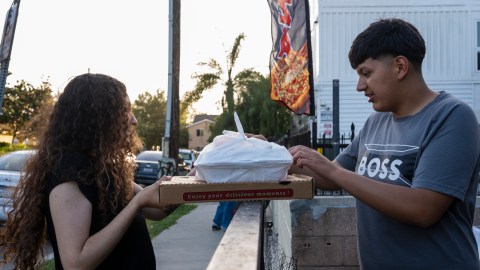Running a Business in South LA District 9 is a mission of surviving raids and Tariffs
We need to support local businesses while the Trump administration nightmare ends

Businesses in South Central LA have been affected by the raids. Crédito: Isaac Creja | Impremedia
The Trump administration clearly isn’t worried about family separations or the pain immigration raids cause in Latino communities. But I want to think that, if nothing else, the federal government must care about the economic damage that its policies decisions —along with tariffs—bring to American businesses.
As a resident of South Los Angeles’ 9th District for more than 15 years, I have seen how this neighborhood—now nearly 80% Latino, 20% africanamericans—has endured decades of hardship, from riots and gang violence to the absence of corporate investment that could create the job opportunities our community needs to thrive.
Unfortunately, the presence of immigration agents is once again taking a heavy toll on this community: businesses are struggling, and the streets are empty. Fear of deportation runs so deep that some U.S. citizens carry their passports in their pockets.
In recent weeks, I’ve spoken with several small business owners in the area—immigrants who came here seeking a better life, and U.S.-born entrepreneurs striving for independence through their own ventures. However, along the way, they’ve encountered the same obstacle: immigration raids.
Just as they were beginning to recover from the devastation of the pandemic, they now feel trapped once again—facing shrinking customer bases, little room for growth, and the painful possibility of laying off employees.
And it raises a deeper question: how can we claim to be putting Americans first if we stifle entrepreneurs’ growth, if we force new generations to worry more about keeping their families together than about going to college or advancing in the jobs they already hold?
We were told that immigration enforcement would target only people with criminal records. The reality, however, is that workers with Latino features are being stopped and taken from the streets, regardless of their documentation status.
To make matters worse, the Supreme Court has now given the green light for agents to resume stops based on a person’s appearance, language, or location.
How can we expect families and the next generation to imagine—or fight for—a better future in this country when their first worry is keeping their families from being torn apart?
And that’s not even considering the impact of tariffs on our communities, which are forcing businesses to raise prices just to survive amid rising inflation.
These rising costs are clearly impacting the wallets of families in our community, where nearly 40% of households earn less than 30% of the area median income—an indicator of extremely low income, according to the Los Angeles Poverty Dashboard by Neighborhood Data for Social Change.
As if that weren’t enough, Dilawar Syed, former Deputy Administrator of the U.S. Small Business Administration, recently noted in an article that business sentiment has reached its lowest point in 15 years—largely due to tariffs. He emphasized that small businesses, which drive the majority of the Gross Domestic Product (GDP) and are the nation’s largest source of employment, have been hit especially hard by these trade policies.
While Trump’s economic and immigration policies are unlikely to change anytime soon, one powerful action we can take as a community is to support the small and large businesses in our own neighborhoods. By keeping our spending local, we help ensure that the money we earn and spend stays within our district—supporting jobs, services, and stability—while we weather this seemingly endless economic nightmare.
(*) José Ugarte is the deputy mayor of Los Angeles City Councilman Curren Price and a human and civil rights advocate. This article is a personal point of view and does not represent the views of the City or the Council office.




